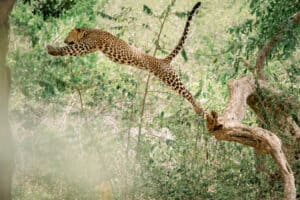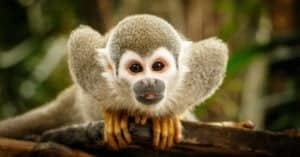It’s a common perception that monkeys mainly eat bananas and other fruits. However, some monkeys are frugivores and only eat fruits. At the same time, some are omnivorous and eat different foods like insects and even animal meat. So, do monkeys eat meat and what types of meat they eat? Let’s find out!
Is It Common for Monkeys To Eat Meat?
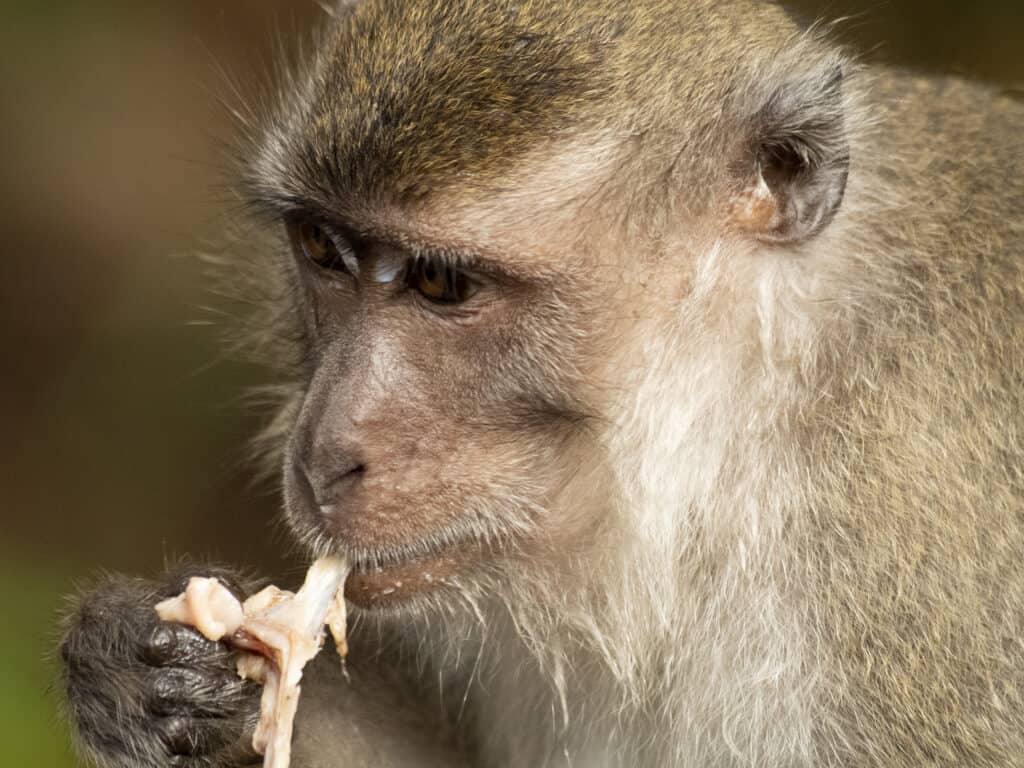
Many monkeys eat meat as it is a source of protein.
©iStock.com/Josh Forwood
According to David Watts, an anthropologist at Yale University, most monkey species are meat-eaters. Watts considered over 400 studies of meat-eating among primates and found that 12 of the current 16 families are meat-eaters. This adds up to 89 different species of monkeys that eat meat.
Many monkeys gain their protein from eating eggs they manage to steal. Although most of these monkeys target birds’ eggs, the capuchin monkey is known to eat the eggs of their predator, the black caiman. Other monkeys, like chimpanzees, often eat the meat left over by other chimpanzees. Eating meat provides an immediate energy source and can deliver twice the amount of calories of protein or carbohydrates.
Monkeys That Regularly Eat Meat
The callitrichids group of monkeys consists of marmosets, tamarins, and lion tamarins in South America. These monkeys eat reptiles and amphibians. Other monkeys that enjoy eating reptiles and amphibians are squirrel monkeys, blue monkeys, and all the old world Cercopithecines, which are vervet monkeys, macaques, and mandrills.
Monkeys like baboons and capuchins eat a wide range of meat. Baboons are also omnivorous and prey on over 21 mammal species. They commonly eat fish, eggs, snakes, hares, antelope, sheep, and goats.
On the other hand, chimpanzees eat the most meat out of all monkeys. Chimpanzees prey on 45 different species of animals, and the male chimpanzees will mainly work together to hunt and feed on the animals.
Monkeys That Rarely, or Never, Eat Meat
Colobine monkeys, a group of 61 species found in Africa, are herbivores. The black-and-white colobus monkeys of this group are so advanced that their gut has evolved to include a fermenting chamber that makes it easier to digest harder natural materials, like lichen and bark. And although gorillas are known to eat insects, they are not known to be hunters and largely avoid eating meat. Also, many monkeys get their protein from eating insects instead of hunting for birds, fish, and mammals. An example of such a species is the tarsiers. Most of their diet consists of spiders, beetles, and cicadas.
What Do Monkeys Eat Besides Meat and Insects?
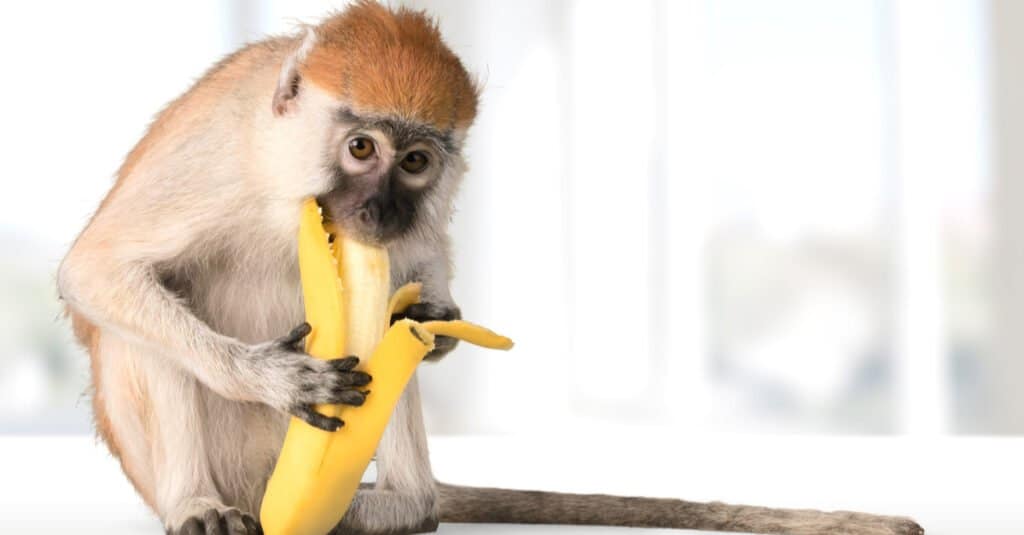
Fruit is a large part of the diet of many monkeys as it provides sugars, vitamins, and carbohydrates they need.
©Billion Photos/Shutterstock.com
A monkey’s diet depends on its species and location. Wild frugivore monkeys are known to eat fruits like:
- Bananas
- Mangoes
- Fleshy fruits
- Pomes
- Drupes
- Grasses
- Leaves
- Flowers
- Buds
- Seeds
- Gum
- Nectar
Wild, insectivorous monkeys eat insects and snails. In contrast, carnivorous monkeys eat insects, snails, eggs, birds, lizards, bats, squirrels, and other small vertebrates. Omnivorous monkeys have a mixture of frugivorous (fruits), insectivorous (insects), and carnivorous (meat) diets. Monkeys that live near cities and human settlements eat fruits found in the wild, food provided by humans, and even leftovers in trash cans.
How Do Monkeys Find Food?
Monkeys live in areas near suitable sources as they prefer eating easily accessible foods that give them the sugar, carbohydrates, fiber, and protein they need. Old-world monkeys in Africa and Asia use their opposable thumbs to climb trees and grasp fruit. These monkeys are also good foragers and can easily find food on the ground. In addition, old-world monkeys have an anatomical advantage that new-world monkeys don’t have, which is pouches in their cheeks for storing food. New world monkeys are exceptionally smart and use tools, like rocks, to crack open shell nuts. Scientists and others have also seen them using sticks to open up the nests of ants and termites and even pry eggs from nests. Monkeys even use rocks to break open nuts or the shells of prey.
What Do Pet and Captive Monkeys Eat?
The diet of the pet and captive monkeys depends on their species, condition, size, health, and reproductive status. However, their diets must give them all the necessary nutrients and vitamins to be happy and healthy. So, if you want a pet monkey, observe how they obtain their food in the wild. Then, try to duplicate that situation because monkeys naturally want to forage and eat socially.
Monkey owners and zookeepers must create a dietary plan based on all necessary factors. Then, they must monitor and alter this plan according to the monkey’s responses. Monkeys are wild animals, so you should mainly feed them fresh, raw, natural food, but sometimes they might need artificial foods. Examples include supplements that provide required proteins, vitamins, and minerals. All monkeys can have deficiencies in vitamin D3, calcium, and vitamin A while new world monkeys, like marmosets and tamarins, commonly have shortages in vitamin C and vitamin D3.
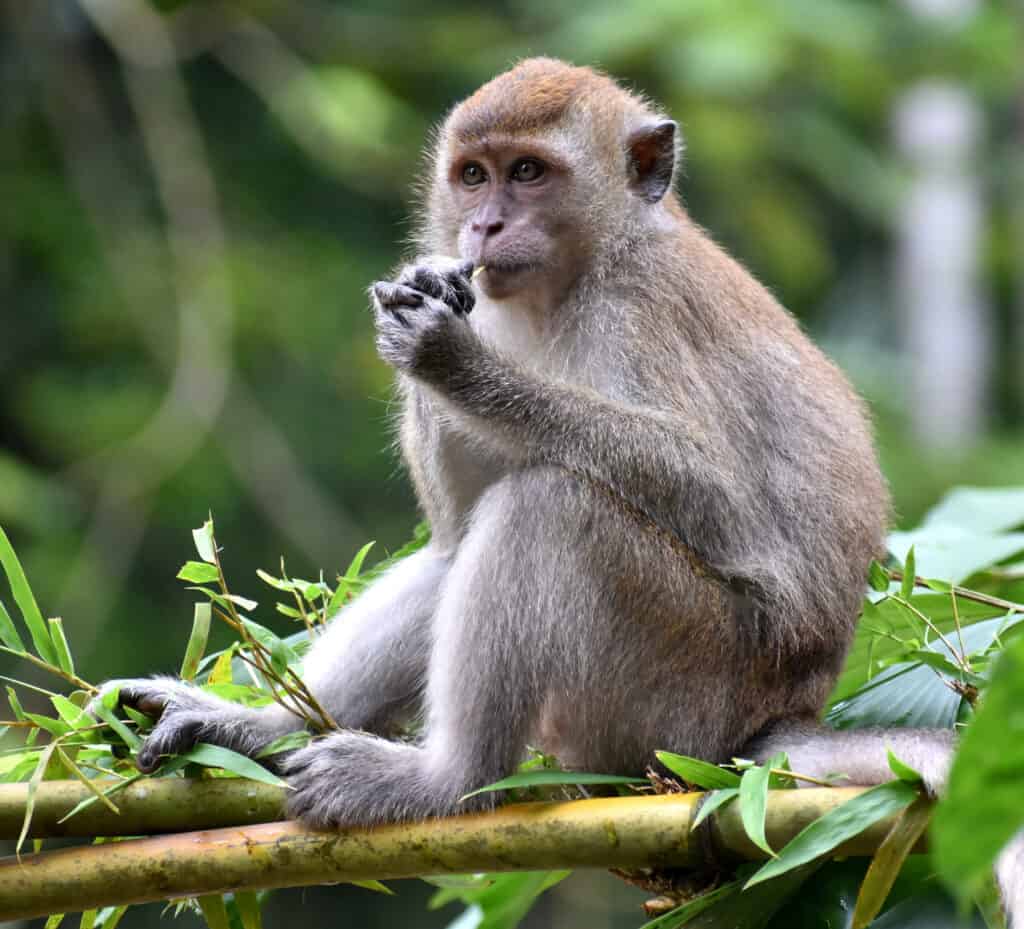
Monkeys need to eat foods high in fiber to help digestion.
©iStock.com/Michael Carr
Roughage also needs to be factored into the diets of all monkeys. If monkeys do not have enough roughage in their diet, they may suffer from diarrhea. Fiber-rich foods include roughage like leaves and pelleted foods. These foods support the monkey’s gut health and teeth, keeping them clean and strong.
Which Foods Are Bad for Monkeys?
You can give milk and dairy products to monkeys, but you should do it infrequently and in small amounts. Monkeys who eat too many dairy products can suffer from diarrhea and bloating. You should also not give your pet monkey too many sweet foods, like bananas. Too much sugar in the diet can cause poor dental health and even diabetes.
Although these foods are bad for monkeys, they often don’t result in fatalities while other foods do. For example, the Devil’s Trumpet or Angel’s Trumpet, a flowering plant, is poisonous to monkeys. Certain pesticides are toxic to monkeys, like those containing organophosphate and organochlorine DDT. Pesticides that contain organochlorine DDT also affect the monkey’s fertility, so always wash fruit properly and ensure you get your pet’s food from reliable sources.
The photo featured at the top of this post is © iStock.com/Skouatroulio
Thank you for reading! Have some feedback for us? Contact the AZ Animals editorial team.




